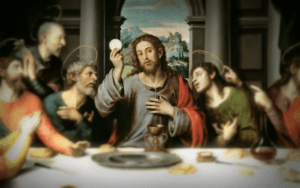
John 6:51-58
5 New Testament passages:
- The Gospel of John’s Bread of Life Discourse (chapter 6); Jesus said: “My flesh is true food and my blood is true drink. Whoever eats my flesh and drinks my blood remains in me and I in him.” (John 6:55-56)
- The Synoptic Gospels’ Last Supper account: He took bread, blessed and broke it, and gave it to His disciples, saying: “Take and eat, this is my Body.” (Matthew 26:26; Mark 14:22; Luke 22:19) Then He took the cup, gave thanks and gave it to them, saying: “Drink from it, all of you. This is my blood of the covenant.” (Matthew 26:27-28; Mark 14:24; Luke 22:20)
- Paul’s account of the Last Supper: For I received from the Lord what I also handed on to you, that the Lord Jesus, on the night he was handed over, took bread, and, after he had given thanks, broke it and said, “This is my body that is for you. Do this in remembrance of me. “In the same way also the cup, after supper, saying, “This cup is the new covenant in my blood. Do this, as often as you drink it, in remembrance of me.” For as often as you eat this bread and drink the cup, you proclaim the death of the Lord until he comes. (1Corinthians 11:23-26).
If we are to understand what Jesus said in the fullest sense in John chapter 6, then the true food and true drink which Jesus gives is precisely His own flesh and His own blood which He gave to His disciples at the Last Supper.
Note that St. Pauls’ account of the Last Supper adds: “Do this is remembrance of me.” (cf. 1Corinthians 11:24-25). Through these words, we come to understand that the giving of Jesus’ flesh and blood at the Last Supper is not a one-time thing. In fact, the Lord commanded His disciples to do this in remembrance of Him. The Eucharist is the reality of what Jesus said about His Body and Blood in John chapter 6, and in the Last Supper accounts of the Synoptic Gospels and the Letter of St. Paul to the Corinthians.
Jesus continues to give His Body and Blood to the faithful each time the Eucharist is celebrated:
- Post-resurrection – on the Road to Emmaus, Jesus made Himself known in the Breaking of the Bread (Luke 24:13-35)
- The first Christian converts devoted themselves to the teaching of the apostles and to the communal life, to the breaking of the bread and to the prayers. Every day the Lord added to their number those who were being saved. (Acts 2:42-47)
- Celebration of the Eucharist by the Apostles, then by the bishops and presbyters continues today.